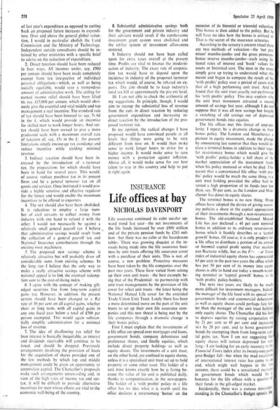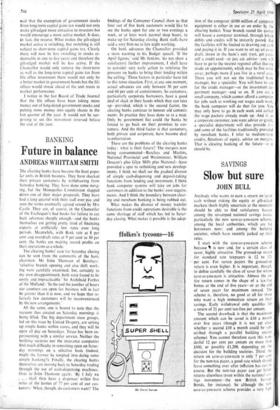Life offices at bay
INSURANCE NICHOLAS DAVENPORT .
Life assurance continued its calm secular up- ward trend last year—the net investments of the life funds increased by over £800 million and of the private pension funds by £283 mil- lion—but there was no calm at the boardroom tables. There was growing disquiet at the in- roads being made into the life assurance busi- ness by unit trusts offering life assurance cover with a purchase of their units. This is not, of course, a new problem. Protective measures have been taken by the life companies over the past two years. These have varied from setting up their own unit trusts—the best example be- ing that of the Prudential—to partnership with unit trust managements by the provision of life cover for select unit trusts—the latest being the National Mutual Life cover for the extended Trade Union Unit Trust. Lately there has been a more determined move on the part of the unit trusts to set up their own life assurance com- panies and this new threat is being met by the life companies through a dramatic change 'n their bonus policy.
First I must explain that the investments of a life office are spread over mortgages and loans, government bonds, company debentures and preference shares, and finally equities, which include direct property holdings as well as equity shares. The investments of a unit trust, on the other hand, are confined to equity shares, unless it is a specialised unit trust set up to hold property or some other asset. The holder of a unit trust knows exactly how he is faring be- cause the value of his unit is published daily, thanks to computerisation, in the newspapers. The holder of a 'with profits' policy in a life office has no idea what it is worth until the office declares a reversionary 'bonus' on the
occasion of its biennial or triennial valuation. This bonus is then added to the policy. But he will have no idea how the bonus is arrived at. That is the secret of the insurance actuaries.
According to the actuary's ancient ritual there are two methods of valuation—the 'net pre- mium' mumbo-jumbo and the gross premium.
bonus reserve mumbo-jumbo—each using fie. tional rates of interest and 'book' values for assets or historical cost. The man in the street simply gave up trying to understand what this meant and began to compare the result of his 'with pfofits' policy over a period of years with that of a high performing unit trust. And he found that the unit trust usually out-performed his 'with profits' policy This may explain why the unit trust movement attracted a record amount of savings last year, although I do not suppose that it was all new savings but largely a switching of old savings out of depressed government bonds into equities.
The life offices met this threat of unpopu- larity, I repeat, by a dramatic change in their bonus policy. The London and Manchester, a pioneer in equity investment, made the plunge by announcing last summer that they would de- clare a terminal bonus in addition to their regu- lar reversionary bonus which would give the 'with profits' policy-holder a full share of the market appreciation of the investment funds when his policy matured or when he died. This meant that a conventional life office 'with pro- fits' policy would be much the same thing as a unit trust holding provided the office had in- vested a high proportion of its funds (not less than, say. 50 per cent, as the London and Man- chester has done) in equity shares.
The terminal bonus is no new thing. Many offices have adopted the device of giving matur- ing policies a share in the capital appreciation of their investments through a non-reversionary bonus. The old-established National Mutual Life has just declared a 40 per cent terminal bonus in addition to its ordinary reversionary . bonus which it frankly describes as a 'capital growth' bonus. Of course, it is only prudent for a life office to distribute a portion of its annual or biennial capital profit seeing that markets can fluctuate wildly, but as the Fi,*- c a/ Times index of industrial equity shares has appreciated 65 per cent in the past two years the office which has put 50 per cent of its money into equity shares is able to hand out today a mouth-water- ing terminal or 'capital growth' bonus to in 'with profits' policy-holders.
The next two years are likely to be much more difficult for investment managers. Indeed. the manager of the life fund with its spread over government bonds and commercial debentures as well as equity shares could perhaps fare bet- ter than the manager of the unit trust holding only equity shares. The Chancellor did his best to depress equities by raising corporation 131 by 21 per cent to 45 per cent and increasin; ser by 28 per cent, and to boost government bonds by exempting them from long-term capi- tal gains tax. Now I am not suggesting that equity shares will remain depressed for very long—I am looking for an early recovery in the Financial Times index after its twenty-one-point post-Budget fall—but when the mad escalation of international interest rates has come to 30 end, which might well happen in the late autumn, there could be a sensational recovery in government bonds which would be a bonanza for the life offices with a quarter of their funds in the gilt-edged market. Incidentally, there was a curious misunder- standing in thq Chancellor's Budget speech.
said that the exemption of government stocks from long-term capital gains tax would not only make gilt-edged more attractive to investors but would encourage a more active market. It does, in fact, the reverse. What makes the gilt-edged market active is switching, but switching is still subject to short-term capital gains tax. Clearly there will now be less switching in stocks re- deemable in one to five years and therefore the gilt-edged market will be less active. If the Chancellor would only remove the short-term as well as the long-term capital gains tax from life office investment there would not only be a better market in government bonds but the life offices would streak ahead of the unit trusts in market performance.
1 notice in the last Board of Trade Journal that the life offices have been taking more money out of long-dated government stocks and putting more money into equity shares in the last quarter of the year. It would not be sur- prising to see this movement reversed before the end of the year.











































 Previous page
Previous page